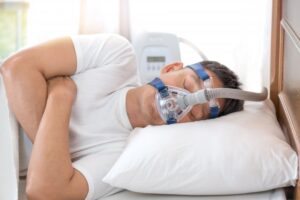
Sleep apnea and gum disease may seem like two entirely separate health issues; one affects your sleep, and the other your mouth. However, growing research suggests that these two conditions are more closely connected than you might think. Understanding the relationship between sleep apnea and gum disease (periodontal disease) can help you take better care of both your oral and overall health.
What is Sleep Apnea?
Sleep apnea is a condition where breathing repeatedly stops and starts during sleep. The most common type, obstructive sleep apnea (OSA), occurs when the muscles in the throat relax too much and block the airway. This leads to poor-quality sleep, frequent awakenings, and reduced oxygen levels throughout the night.
Common symptoms of sleep apnea include:
- Loud snoring.
- Gasping for air during sleep.
- Excessive daytime sleepiness.
- Morning headaches.
- Dry mouth upon waking.
What is Gum Disease?
Gum disease, also called periodontal disease, is a bacterial infection of the gums and tissues that support the teeth. It begins with gingivitis, which causes red, swollen, and bleeding gums. If left untreated, it can progress to periodontitis, where the gums pull away from the teeth, bone is lost, and teeth may loosen or fall out.
Gum disease is primarily caused by plaque buildup, poor oral hygiene, smoking, and systemic health conditions like diabetes.
How Sleep Apnea and Gum Disease Are Connected
Research has found a significant correlation between sleep apnea and an increased risk of gum disease. Here’s why:
Mouth Breathing and Dry Mouth
Many people with sleep apnea breathe through their mouths while sleeping. Mouth breathing causes dry mouth, which reduces the amount of saliva that helps wash away harmful bacteria. A dry oral environment allows plaque and bacteria to accumulate more easily, leading to gum inflammation and infection.
Inflammation in the Body
Both sleep apnea and gum disease are associated with systemic inflammation. When you suffer from sleep apnea, your body experiences repeated oxygen deprivation and stress responses throughout the night. This increases inflammation throughout the body, including the gums, making it easier for gum disease to take hold and harder for your body to fight infection.
Weakened Immune Response
Chronic sleep deprivation caused by sleep apnea can impair your immune system, leaving you less able to combat oral bacteria and inflammation. As a result, people with untreated sleep apnea may find that their gum disease progresses more quickly.
What You Can Do
If you suffer from either sleep apnea or gum disease, it’s essential to talk to your healthcare providers and take proactive steps:
- Get tested for sleep apnea if you experience symptoms like snoring, fatigue, or dry mouth.
- Maintain excellent oral hygiene with daily brushing, flossing, and regular dental cleanings.
- Use a CPAP machine or oral appliance if prescribed, to keep airways open and reduce mouth breathing.
- Stay hydrated and avoid alcohol or tobacco, which can worsen both conditions.
There’s a strong link between sleep apnea and gum disease, and each can negatively affect the other. By understanding this connection and seeking treatment for both conditions, you can protect not only your smile but your overall health and quality of life. Regular dental visits and good communication with your healthcare team are key to managing both conditions effectively.
About the Author
Dr. Jay Lopez is a 4th generation Tucson native. He is a graduate of the University of Colorado Health Science Center School of Dentistry and has been in practice since 1997. Dr. Lopez has continued his education with training in specialties like dental implants, Invisalign, oral surgery, and aesthetic treatments, and is a proud graduate, mentor, and clinical instructor of the world-renowned Kois Center in Seattle. Do you suffer from sleep apnea? If so, Dr. Lopez and our expert team can provide therapy to help you get your rest back. Schedule your appointment online or call us at (520) 886-8090.
